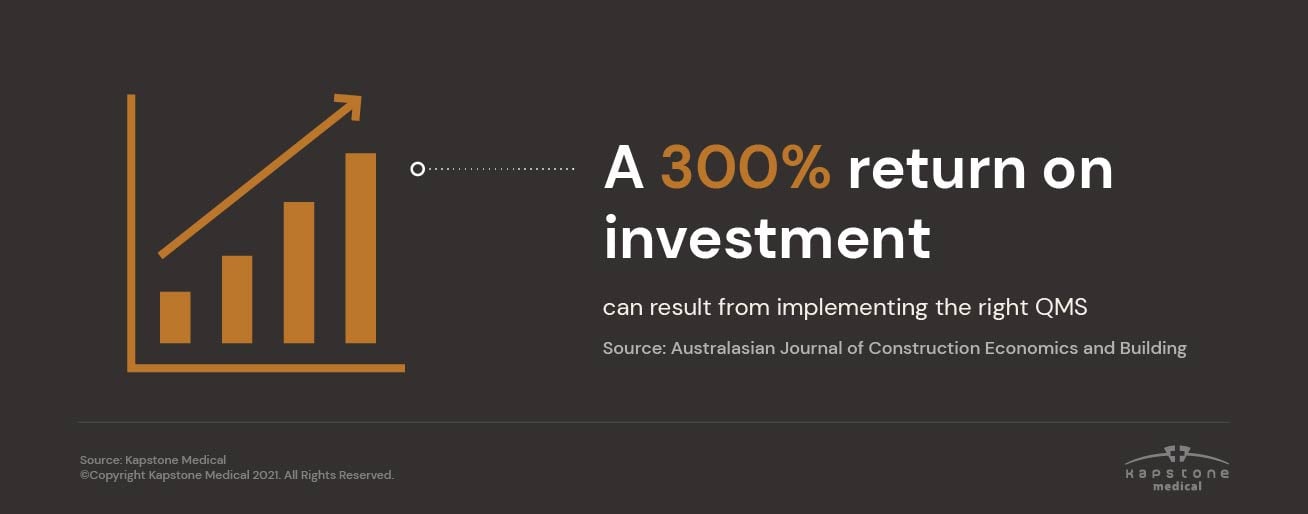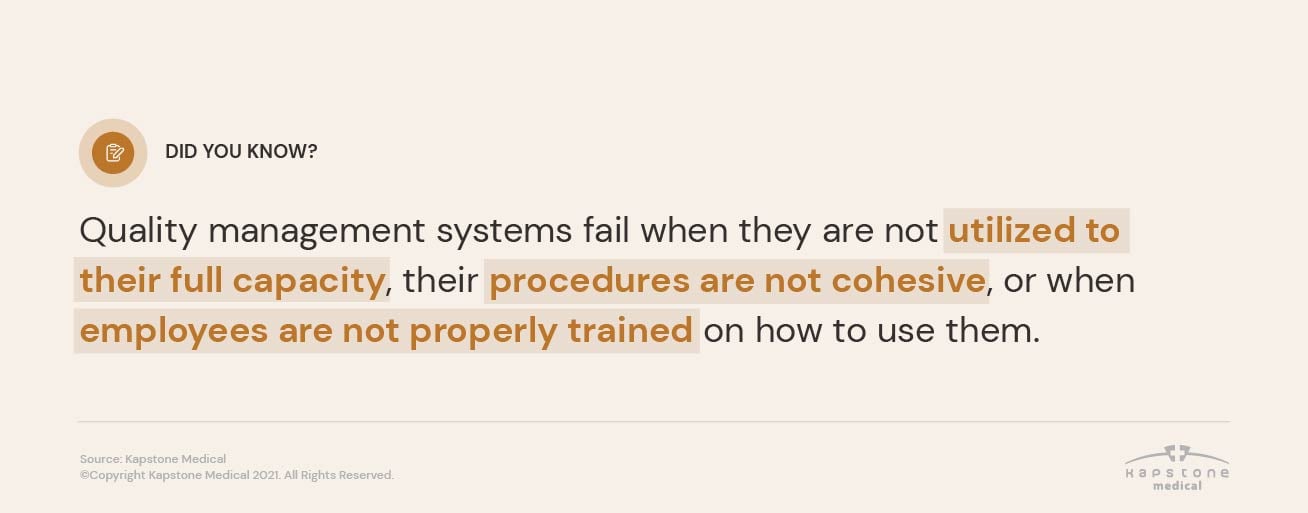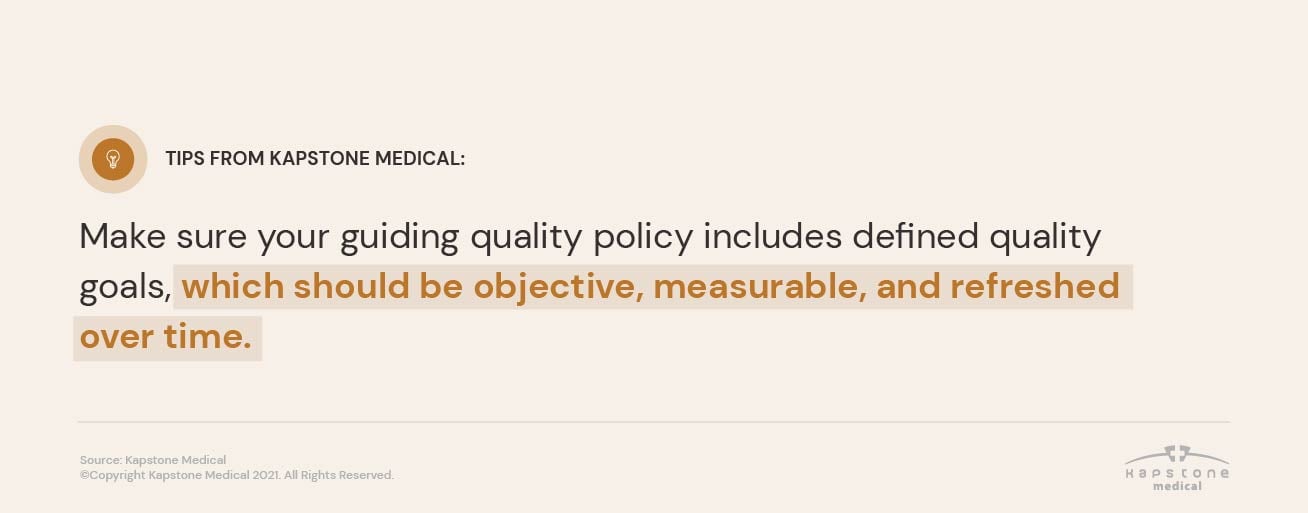Most medical device companies already have a QMS in place. It’s hard to track, document, and validate any of your work without one! However, these systems are often rudimentary or incomplete—through no fault of the companies.
Without years (or decades) of industry experience, it’s very difficult to understand all of the elements that go into a successful medical device QMS. It is even more difficult to create and maintain a system that complies with ISO 13485 or other regulatory standards.
In this blog, we will help you understand—and address—the signs that your QMS needs an upgrade. Once you’re ready to upgrade, the team at Kapstone Medical can help you choose the system that’s right for your needs.
The Importance of Quality Management Systems Upgrades
Why is it so important to upgrade your QMS? We can think of three reasons:
Risk Mitigation
A solid, proven QMS can help you minimize the risks associated with proper medical device documentation and production. Few industries are subject to such strict safety standards—and with good reason! The smallest production or documentation error can have catastrophic downstream effects for your customers and business.
 Efficiency Through Formalization
Efficiency Through Formalization
Investing in an appropriate and efficient quality management system signals to your employees (and partners), at all levels, that your company is committed to quality. It can foster a culture of continuous improvement where everyone is motivated to do their best work. Plus, the more formal and clear your process is, the easier it is for all parties to comply—and the more efficient your output will become. In fact, one study found that implementing the right QMS resulted in a 300% return on investment.
Regulatory Compliance
The right medical device quality management system will help you bake regulatory compliance into your everyday work efforts. No need to build custom workflows, create documents and forms, or go out of your way to prove compliance—the system can handle it right from the start. Doing it right the first time is much easier than having to go back and correct documents or processes.
Why Do Quality Management Systems Fail?
In most cases, quality management systems fail when they are not utilized to their full capacity, their procedures are not cohesive, or when employees are not properly trained on how to use them. Fast-growing organizations, or those that are pivoting into a new area of business, may also find that their QMS does not keep pace

5 Signs Your Quality Management System Is Failing And Needs an Upgrade
- You’re worried you can’t pass a surprise regulatory audit
- You can’t locate important documentation
- Your employees can’t follow SOPs due to inaccessibility, ambiguity, conflicting and complicated procedures, or gaps in and between procedures.
- Your corrective and preventative actions (CAPA) are left open for too long before resolution
- Your organization has not committed to a culture of quality and continuous improvement
Evaluating the Effectiveness of a Quality Management System
We’ve spoken about the importance of investing in a proven quality management system. But how do you ensure that the QMS is being utilized effectively and delivering on its promise?
Effectiveness comes from the top down. When management talks the talk (espouses a commitment to quality) and walks the walk (invests in quality management systems and sufficient training), employees will take notice—and take on those principles in their own work.

You can further enhance your organization’s commitment to quality, and therefore the effectiveness of your QMS, by establishing a guiding quality policy. This policy should be grounded in your overall mission and purpose (i.e. to deliver lifesaving solutions to patients) and clearly communicated and understood throughout the company. Make sure it includes defined quality goals, which should be objective, measurable, and refreshed over time.
Ultimately, evaluating the effectiveness of a QMS depends on continuous monitoring and review. We suggest appointing a designated employee to be your full-time QMS expert; they’ll know the QMS backwards and forwards and be able to mitigate compliance issues quickly. In addition, your QMS should be subject to more formal routine reviews that take into account:
- Customer feedback and complaints
- Adverse events and regulatory reporting
- Audits (internal, external, and supplier)
- Process KPIs
- Product KPIs
- Status of CAPA (corrective and preventive action)
- Follow-ups from previous informal or formal reviews
- Issues that could impact the QMS (i.e. regulatory updates)
- Any other opportunities for improvement
How to Create an ISO 13485:2016 QMS Audit Checklist
All ISO 13485-certified medical device companies must undergo QMS audits. The International Organization for Standards (ISO) gives two reasons for completing these formal audits:
- To ensure that the processes are meeting the planned arrangements and regulatory requirements that the company has identified for the process in the QMS
- To ensure that the process is implemented and maintained effectively
Creating a checklist can help you prepare for these audits efficiently and maximize your chance of success. Start by reviewing the ISO 13485:2016 standard to determine what you will need to audit and how. Identify the questions you want to ask and structure the audit so that you can find the answers efficiently.
What is ISO 13485?
ISO 13485 is just one of the International Organization for Standards’ thousands of international standards. This one pertains specifically to organizations involved in any part of the medical device industry, encompassing design and development, production, storage and distribution, installation, servicing, or provision of associated activities like technical support. The standard also applies to entities that provide quality management system (QMS)-related services to medical device companies (like Kapstone, for example).

ISO 13485 dictates the QMS requirements for any medical device company that falls into one or more of the above categories. Companies that adhere to these requirements will have demonstrated that they are consistently able to fulfill the needs of both their customers and regulatory bodies.
For a more in-depth look at ISO 13485 and the process of obtaining a certification, check out this blog post.
Where to Find ISO 13485 Audit Checklists Online
The team at Kapstone Medical is happy to help you create an ISO 13485 QMS audit checklist. You can also find reputable checklists online. Here are a few examples.
- ISO 13485 and Medical Device Directive Checklist (MDD)
This checklist guides you to QMS compliance with both ISO 13485 and the EU Medical Device Directive. While the MDD has since been replaced with the updated Medical Device Regulation (more on that here and here), many of the particulars outlined in this checklist still apply. - ISO 13485 Planner & Checklist
This resource helps you prepare, step by step, for an ISO 13485 audit. It also includes an appendix that will help you differentiate between the ISO 13485:2003 and updated 2016 standard. It is particularly useful for organizations who are looking to update their QMS to comply with the latest ISO guidance.
What to Consider When Upgrading Your Quality Management System
Factors to consider when choosing a system include:
- Regulatory requirements in your industry sector and geographical market
- Whether you’re interested in a proven legacy approach to quality management or want to implement a modern technological system (sometimes known as an eQMS, or electronic QMS)
- Cost-benefit analysis
- Usability
Kapstone can help you choose, implement, maintain, and audit the right quality management system for your business. We’ll work together to determine your business goals and needs and choose a system that addresses them. Whether you choose to implement our proven ISO 13485-certified QMS (as many of our clients have done), optimize your own, or go with another system entirely, we can help.
Get in touch with the team at Kapstone today and start to foster your culture of quality.



